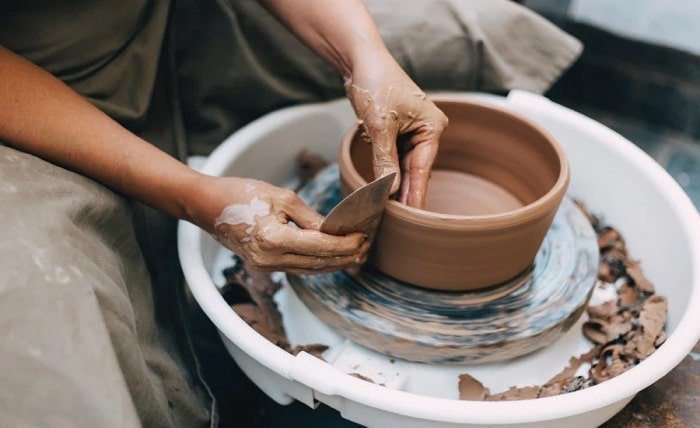Unlock Your Creativity: The Ultimate Guide to Pottery Classes

Pottery has been a cherished art form for centuries, blending creativity with craftsmanship. Enrolling in a pottery class can be a transformative experience, allowing you to explore your artistic side while mastering the techniques of clay shaping and glazing. Whether you’re a beginner or looking to refine your skills, a pottery class offers the perfect environment to nurture your creativity and produce beautiful, tangible art pieces.
Why Choose a Pottery Class?
Choosing to join a pottery class opens up a world of artistic possibilities. Unlike other art forms, pottery allows you to create functional and decorative items that you can use or display. In a pottery class, you’ll receive hands-on instruction from experienced instructors who can guide you through the intricacies of working with clay. Additionally, the communal aspect of a pottery class fosters a supportive environment where you can share ideas, receive feedback, and be inspired by fellow artists.
What to Expect in a Pottery Class
When you enroll in a pottery class, you can expect a structured yet creative learning experience. Most pottery classes begin with an introduction to the basics of clay preparation and handling. You’ll learn various techniques such as wheel throwing, hand building, and glazing. A typical pottery class provides all the necessary tools and materials, allowing you to focus entirely on honing your skills. Additionally, pottery classes often include time for individual projects, giving you the opportunity to apply what you’ve learned and develop your unique style.
Benefits of Taking a Pottery Class
Participating in a pottery class offers numerous benefits beyond just learning a new skill. Engaging in pottery can be therapeutic, providing a mindful activity that reduces stress and enhances mental well-being. A pottery class also encourages patience and perseverance, as working with clay requires attention to detail and the ability to overcome challenges. Moreover, completing projects in a pottery class can boost your confidence and provide a sense of accomplishment, knowing that you’ve created something beautiful and functional with your own hands.
Choosing the Right Pottery Class for You
Selecting the right pottery class is crucial to ensure you have a positive and productive experience. When searching for a pottery class, consider factors such as the instructor’s expertise, class size, and the types of techniques taught. Some pottery classes may focus more on wheel throwing, while others emphasize hand building or sculptural work. Additionally, evaluate the class schedule and location to find a pottery class that fits seamlessly into your lifestyle. Reading reviews and seeking recommendations can also help you choose a pottery class that aligns with your artistic goals and interests.
Essential Tools and Materials in a Pottery Class
A pottery class provides access to a variety of tools and materials essential for creating pottery. Common tools in a pottery class include pottery wheels, clay, sculpting tools, and glazes. Understanding the purpose and proper use of each tool is fundamental to your success in a pottery class. Instructors in a pottery class will demonstrate how to handle the wheel, shape the clay, and apply glazes effectively. Additionally, a pottery class often supplies the necessary materials, allowing you to experiment with different types of clay and finishes without the need for significant personal investment.
Techniques You’ll Learn in a Pottery Class
A pottery class covers a wide range of techniques that are essential for creating diverse pottery pieces. Some of the key techniques taught in a pottery class include:
- Wheel Throwing: Mastering the pottery wheel is a fundamental skill taught in a pottery class. You’ll learn how to center the clay, shape it into various forms, and refine your pieces for consistency and quality.
- Hand Building: A pottery class often includes instruction on hand-building techniques such as pinch pots, coil building, and slab construction. These methods allow for greater flexibility and creativity in your designs.
- Glazing and Firing: Understanding the glazing process and the firing techniques used in a pottery class is crucial for finishing your pieces. You’ll learn how to apply glazes, create decorative effects, and properly fire your pottery to achieve the desired results.
- Sculptural Techniques: For those interested in more artistic expressions, a pottery class may delve into sculptural techniques, enabling you to create intricate and detailed ceramic art pieces.
Each of these techniques is an integral part of a pottery class, providing you with a comprehensive skill set to excel in the art of pottery.
Tips for Success in a Pottery Class
To make the most of your pottery class experience, consider the following tips:
- Stay Patient: Pottery requires time and patience. Don’t rush the process; allow yourself to learn and grow at your own pace in a pottery class.
- Ask Questions: Don’t hesitate to ask your instructor questions during a pottery class. Clarifying doubts can enhance your understanding and improve your skills.
- Practice Regularly: Consistent practice is key to mastering pottery techniques taught in a pottery class. Take advantage of any extra time provided in class to refine your work.
- Stay Organized: Keep your workspace clean and organized in a pottery class. This helps in maintaining focus and efficiency while working on your projects.
- Embrace Mistakes: Mistakes are part of the learning process in a pottery class. Use them as opportunities to learn and improve your techniques.
Implementing these tips can significantly enhance your learning experience and help you succeed in a pottery class.
The Community Aspect of Pottery Classes
One of the most rewarding aspects of a pottery class is the sense of community it fosters. Being part of a pottery class allows you to connect with like-minded individuals who share your passion for pottery. This community support can be invaluable, providing encouragement, inspiration, and constructive feedback. Participating in group projects or exhibitions organized by a pottery class can further enhance your social experience, making pottery not just an individual pursuit but a shared journey of artistic exploration.
Conclusion
Joining a pottery class is an enriching experience that offers both creative and personal growth opportunities. From learning fundamental techniques to enjoying the therapeutic benefits of working with clay, a pottery class provides a comprehensive environment to develop your artistic skills. Whether you’re seeking a new hobby, a creative outlet, or a way to connect with a community of artists, enrolling in a pottery class is a rewarding decision that can lead to the creation of beautiful and meaningful ceramic art.
Embrace the journey of pottery by signing up for a pottery class today and unlock your full creative potential!
FAQs
1. What is the typical duration of a pottery class?
The duration of a pottery class can vary widely depending on the institution and the level of instruction. Most pottery classes range from a few weeks to several months, with sessions typically held once or twice a week. Some pottery classes offer intensive workshops that last for a weekend or a week, providing immersive learning experiences.
2. Do I need any prior experience to join a pottery class?
No prior experience is necessary to join a pottery class. Pottery classes are designed to accommodate beginners as well as more experienced artists. In a pottery class, instructors provide step-by-step guidance, ensuring that all participants can follow along and develop their skills regardless of their starting point.
3. What materials and tools are provided in a pottery class?
Most pottery classes supply the essential materials and tools needed for the course. This typically includes clay, pottery wheels, sculpting tools, glazes, and access to kilns for firing your pieces. However, it’s always a good idea to check with the specific pottery class beforehand to understand what is provided and if you need to bring any personal supplies.
4. How much does a pottery class cost?
The cost of a pottery class can vary based on factors such as the duration of the course, the level of instruction, and the location. On average, a pottery class may range from $100 to $500 or more. Some pottery classes offer different pricing tiers or payment plans to accommodate various budgets. It’s recommended to research and compare different pottery classes to find one that fits your financial considerations.
5. What can I expect to create in a pottery class?
In a pottery class, you can expect to create a variety of ceramic pieces depending on the focus of the course. Common projects include bowls, mugs, plates, vases, and decorative sculptures. Advanced pottery classes may also explore more complex forms and techniques, allowing you to experiment with intricate designs and personalized styles. By the end of the pottery class, you’ll have a portfolio of unique pieces that showcase your newfound skills and creativity.




